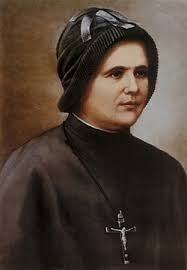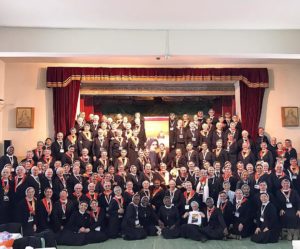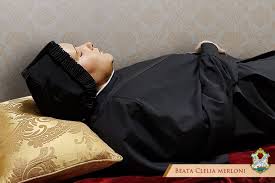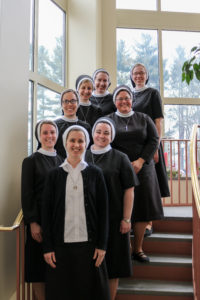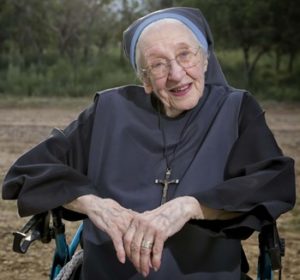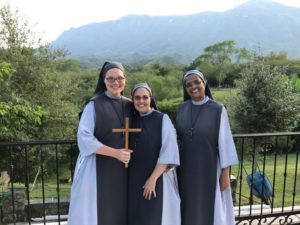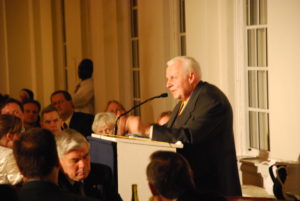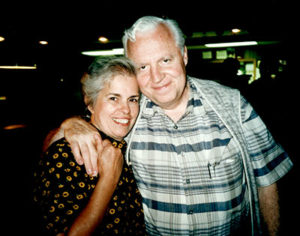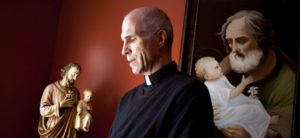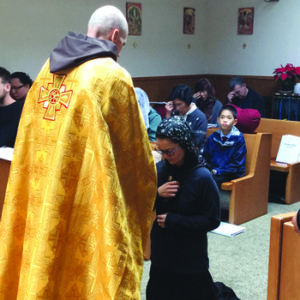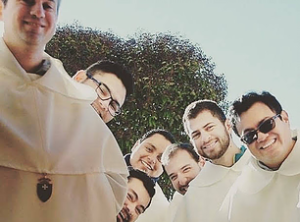 High on a balcony of the lavish Basilica of Our Lady of Mercy in Lima, Peru, a full-size statue of the Blessed Virgin gazes down at pilgrims and tourists.
High on a balcony of the lavish Basilica of Our Lady of Mercy in Lima, Peru, a full-size statue of the Blessed Virgin gazes down at pilgrims and tourists.
The Mercedarian friars there have served the parish for centuries, their white habits a familiar sight in the center of town. But although these priests and brothers are well-recognized in many countries of Latin America, including Mexico, they are practically unknown in the United States.
They plan to change all of that – God willing.
“We’ve done a lot of soul-searching over the last few years, and it seems that the Holy Spirit is asking us to reignite our original charism and make some needed changes,” said Fr. Daniel Bowen, OdeM., the vocation director of the Mercedarian friars in the United States.
“It’s taken years, and a lot of discussion and praying, and now we are taking on new responsibilities and doing things in ways different from the past,” Fr. Daniel said. The Order’s growth will certainly be a helpful factor here. They have expanded from five friars in 1970 to 24 today.
A Charism of Redemption
Fr. Daniel said that the Order, known more formally as the Order of the Blessed Virgin Mary of Mercy, has looked anew at the charism of their order, which is to redeem Christians whose faith is in danger of being lost.
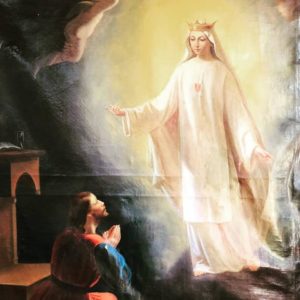 The order was founded in 1218 in Spain by St. Peter Nolasco, who saw the plight of his fellow Christians who were taken captive by Muslims and made into slaves.
The order was founded in 1218 in Spain by St. Peter Nolasco, who saw the plight of his fellow Christians who were taken captive by Muslims and made into slaves.
“St. Peter Nolasco, our founder, would collect money to redeem Christians held as captives in Muslim countries,” Fr. Daniel said. “Today, we rescue Christians from modern forms of captivity, such as social, political, and psychological forms which place their faith in danger.”
New Ministries of Freedom
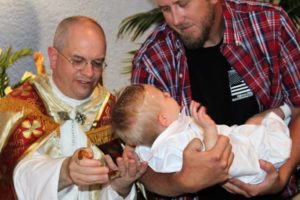 The Order looked at one form of captivity – that of families trapped in vicious cycles of failed marriages. So, in 2016 they started a ministry for marriage – the St. Raymond Nonnatus Foundation for Freedom, Family and Faith. The goal of the group is to promote family life according to Catholic moral principles, under the patronage of St. Raymond Nonnatus, another Mercedarian saint.
The Order looked at one form of captivity – that of families trapped in vicious cycles of failed marriages. So, in 2016 they started a ministry for marriage – the St. Raymond Nonnatus Foundation for Freedom, Family and Faith. The goal of the group is to promote family life according to Catholic moral principles, under the patronage of St. Raymond Nonnatus, another Mercedarian saint.
Also, the U.S. Mercedarians have been given two parishes in San Juan, Puerto Rico. The order has been in the country for at least one hundred years, with friars from a different province serving there. The order has also been to staff two small rural parishes in Jacksonville, FL. This ministry includes acting as chaplains to the nearby prisons. Prison ministry is fully in line with their charism of redemption.
Formation Program Moves Overseas
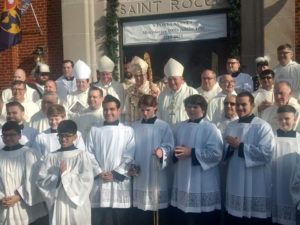 Their formation program will be changed from St. Charles Borromeo Seminary in Philadelphia to Europe for most of the men’s formation. They will initially live in Philadelphia as postulants learning Spanish, spend their novitiate in Spain, and then study at the University of Salamanca, in Spain. Friars headed for the priesthood will study theology in Rome.
Their formation program will be changed from St. Charles Borromeo Seminary in Philadelphia to Europe for most of the men’s formation. They will initially live in Philadelphia as postulants learning Spanish, spend their novitiate in Spain, and then study at the University of Salamanca, in Spain. Friars headed for the priesthood will study theology in Rome.
“We are becoming much more international as we should be, and more closely connected to our European and Spanish roots,” Father Daniel said. “We are excited by these new directions. We see a lot of possibilities for fulfilling our charism and helping to bring about the New Evangelization.”
Younger Faces
In recent years, the Order has seen younger faces in their U.S. contingent. “This of course allows us to grow, and we are grateful to God for this blessing,” Fr. Daniel.
Overall, there are signs of hope for men’s religious institutes in the United States, according to the Center for Applied Research in the Apostolate (CARA). In 1970, there were 116 institutes, and by 2015 the new communities outstripped the folded ones by 15, so that there are 131 men’s religious communities today.
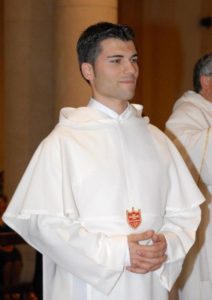 While the number of men in religious life in the U.S. has declined by 58 percent in those forty-five years, the ten smallest religious communities of men increased in number by 84%, according to CARA. The Order of Our Lady of Mercy, one of those ten, experienced the second highest gain – 380%.
While the number of men in religious life in the U.S. has declined by 58 percent in those forty-five years, the ten smallest religious communities of men increased in number by 84%, according to CARA. The Order of Our Lady of Mercy, one of those ten, experienced the second highest gain – 380%.
“We’re riding the wave of the new growth of vocations in the United States,” Fr. Daniel said. “Although we’ve been around since the early part of the twentieth century in America, serving Italian immigrants in Ohio, we definitely have new expectations.”
A Special Fourth Vow
The Order of the Blessed Virgin Mary of Mercy is an international community of priests and brothers who live a life of prayer and communal fraternity. In addition to the vows of poverty, chastity and obedience, members take a special fourth vow to give up their own selves for others whose faith is in danger. Their motto is “my life for your freedom.”
Today, friars of the Order of Mercy continue to rescue others from modern types of captivity, such as social, political, and psychological forms which place their faith in danger. They work in jails, marginal neighborhoods, among addicts, and in hospitals. In the United States, the Order of Mercy gives special emphasis to preserving the faith of families through education and parish work. They now serve in the dioceses of Cleveland, Buffalo, Philadelphia and St. Petersburg, FL.
“We think that these new ministries are fulfilling the needs of modern life, as well as carrying out our original charism” Fr. Daniel said.
Contact the Mercedarian Friars
Read more about the Order of Mercy’s charism on their website, or visit their Facebook page. See the YouTube video of their history, “Redeeming Medieval Captives.”
Think you might have a Mercedarian vocation? Find out about the friars’ next Come and See Discernment Retreat, by emailing Fr. Daniel at vocations@orderofmercy.org. Click also to sign up for the friars’ Vocations Newsletter.
